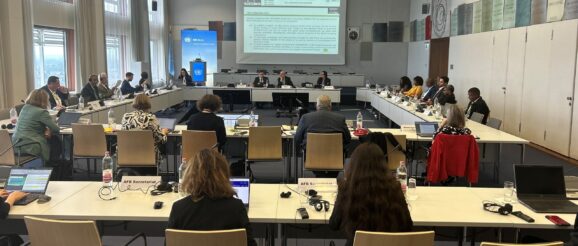Adaptation Fund Board Approves US$ 58 Million in New Adaptation Projects and Expands Innovation Small Grants Partnership – Adaptation Fund

Adaptation Fund Board Approves US$ 58 Million in New Adaptation Projects and Expands Innovation Small Grants Partnership
Board Decisions Help Accelerate Climate Adaptation and Innovation in Developing Countries
October 19, 2023 (Washington, D.C.) – The 41st meeting of the Adaptation Fund (AF) Board held Oct. 12-13 in Bonn, Germany concluded with the approval of US$ 58 million in new adaptation projects and programmes, including an additional US$ 20 million for the Adaptation Fund Climate Innovation Accelerator (AFCIA) small grants programme.
Among the new adaptation projects approved were projects in Peru, the Central African Republic, Lao People’s Democratic Republic, Libya, and Belize. The project in Belize was approved under the Enhanced Direct Access (EDA) window, which is designed to build the capacity of local organizations through locally led action.
The two AFCIA small grants programmes that were approved by the Board will be implemented by the Fund’s accredited multilateral implementing entities, the World Food Programme (WFP) and United Nations Industrial Development Organization (UNIDO), which join other AF implementing partners already administering AFCIA. As new AFCIA partners, each organization will receive US$ 10 million to administer and aggregate small grants (up to US$ 250,000 each) to a wide range of local actors – from CSOs, local governments and businesses to young entrepreneurs, among others — to support innovation in adaptation.
The approval of the AFCIA programmes is a continuation and expansion of AFCIA, which has been successfully implemented since it was launched in 2019. AFCIA provides small grants to developing countries to support innovation for effective, long-term adaptation to climate change and is part of the AF’s Innovation Facility. To this point, the UN Development Programme (UNDP) and UN Environment Programme (UNEP) in conjunction with the Climate Technology Centre and Network (CTCN) have been working with the Fund to administer the grants and have collectively funded over 50 innovation projects in developing countries.
As AFCIA has grown and demand risen, AF decided to invite additional implementing partners to expand the partnership and further accelerate innovation in adaptation.
“The growth of the AFCIA partnership is closely aligned with the Adaptation Fund’s new 5-year Medium Term Strategy which aims to further build on and expand the innovation pillar for effective adaptation actions while also supporting locally led action as well as the action and learning pillars,” said Mr. Antonio Navarra, of Italy, the Board’s Chair. “By accelerating innovative adaptation action and efficient access to finance to respond to the urgent needs and priorities of developing countries, the Fund will continue to serve the Paris Agreement and deliver its mandate to support the most vulnerable communities.”
“The approval of nearly US$ 60 million in new adaptation projects and expansion of the small grants innovation programme through AFCIA will enhance the Adaptation Fund’s concrete adaptation actions on the ground. The Fund has grown rapidly over the last several years, with more than 150 projects in over 100 countries, as the adaptation urgency has increased. We see continued record demand for projects from the developing countries we serve with an active project pipeline of projects waiting for funding of nearly US$ 500 million,” said AF Head Mr. Mikko Ollikainen. “With a resource mobilization target of US$300 million this year, we will increase ambition and synergies at all levels to continue to help meet the record demand for projects and the adaptation urgency across the globe. To respond to that urgency, the Board earlier this year rolled out an expedited process for project proponents to receive timely feedback on their proposals, and we see that it has translated in shorter project preparation times.”
From left : Mikko Ollikainen, Head of AF, Antonio Navarra, AF Board’s Chair, Lucas di Pietro, AF Board’s Vice-Chair
Among other decisions, the Board approved reaccreditation of the Direct Access national implementing entity, Ministry of Finance and Economic Management (MFEM) of the Cook Islands, to continue its partnership with the Fund under the fast-track reaccreditation process. This brings the total number of AF-accredited implementing partners to 55, including 32 NIEs, 9 Regional Implementing Entities (RIEs), and 14 Multilateral Implementing Entities (MIEs).
Board endorsement was also given to project concepts and pre-concepts under development for four additional single-country projects in Honduras, Bangladesh, Pakistan and Uruguay, and two regional projects in Angola and Namibia and Malaysia and the Philippines.
In addition, the Board adopted a proposal for harmonizing implementing entity costs and executing entity fees across the Fund’s various funding windows to make the process more efficient while clarifying its rules and reducing confusion. The Board also provided updates on the continuing progress of implementing a pilot that enables all AF grant funding proposals to be submitted on a rolling basis, rather than at certain points of the year.
In a discussion about the establishment of the Technical Advisory Body on Innovation, the Board requested the secretariat to undertake an analysis of needs and possible options. The Board also discussed a gap analysis of the accreditation and re-accreditation processes and requested the secretariat to present the results to the Board at its next meeting.
The Board further decided to continue discussions on options to further enhance civil society participation and engagement in the Board’s work, report on the carbon footprint of the Fund, and maintain progress in the review of the Fund’s environmental and social policy, and development of a policy on safeguarding against sexual exploitation, abuse, and harassment.
Additionally, with Navarra’s term as Chair finishing next March, current Vice-Chair Lucas di Pietro, of Argentina, a long-serving member of the Board who represents non-annex I Parties, was elected as incoming Chair.
